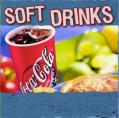
Suzanne Havala Hobbs , Correspondent
Benzene is in some soft drinks and other beverages sold in the United States , many of them consumed regularly by children.
That simple statement alone should be enough to prompt swift and serious action by the federal government.
It hasn’t.
Drinks containing as much as 27 times the federal limit for benzene in drinking water have been found on supermarket shelves, according to the most recent government data publicly available — from the Food and Drug Administration’s Total Diet Study, which examined contaminant levels in beverages sold between 1995 and 2001.
How can that be?
As I wrote last month, the FDA learned nearly 15 years ago that two ingredients — ascorbic acid and sodium benzoate or potassium benzoate — can interact in products and form benzene, a carcinogen. Certain conditions — heat and light — can accelerate benzene production in drinks.
In the early 1990s, after first learning of this problem, FDA entrusted industry to take voluntary steps to reduce the benzene content of beverages. No public announcement was made.
I spoke last week with Mike Redman, vice president for scientific, technical and regulatory affairs for the American Beverage Association. Redman also worked as a soft drink industry representative in the early 1990s and discussed the issue of benzene contamination with FDA officials then.
Redman said that back then FDA did not dictate specific steps for reducing benzene in drinks.
“The agreement was, because FDA is not product formulators, either, and they’ll be the first to tell you that, that they left that up to the industry to determine the best ways for the individual products to lower those benzene levels,” Redman said.
Whatever the agreement was between FDA and the soft drink industry, the problem hasn’t been fixed.
Recent independent laboratory tests have found benzene in soft drinks at levels higher than 5 parts per billion, the maximum level allowed by the Environmental Protection Agency in drinking water.
As a result, FDA has begun testing soft drinks again for benzene. However, the agency isn’t releasing the data to the public.
“To release all the data now could be confusing,” Laura Tarantino, the FDA’s director of food additive safety, told the Associated Press. “It’s not only not good for companies; it’s not particularly good for consumers. It doesn’t give them any useful information. One of the misperceptions is that anytime you see ascorbic acid and benzoate, you’re going to automatically have high levels of benzene, and that just isn’t so.”
It may certainly be true that not all drinks containing the combination of ascorbic acid and benzoates also contain benzene. But we do know now that some of them do — and at levels that would require sharp warnings if it were in your drinking water.
In our modern, industrialized world it may be impossible to avoid all exposures to contaminants such as benzene. The biggest benzene exposures for most people come when filling up a gas tank or driving in heavy traffic.
But that doesn’t excuse the presence of a toxic, cancer-causing substance in a manufactured product that’s entirely optional in our diets.
Without attention to this problem from the media and our elected representatives, FDA and the soft drink industry are likely to reach another ineffective and soon-to-be-neglected gentlemen’s agreements.
In which case, consider this column your warning label.
Dr. Bob’s Blog is not intended as medical advice. The writings and statements on this website have not reviewed and/or approved by the FDA. Our products are not meant to diagnose, treat, cure or prevent any disease. Rather they are meant to demonstrate that aging can be slowed and even reversed and that Great Health achieved when the most fundamental nutritional needs of the human body are met. Always consult a medical doctor or other medical professional when you consider it necessary.
Dr. Bob’s Blog is covered under (47 U.S.C. § 230): “No provider or user of an interactive computer service shall be treated as the publisher or speaker of any information provided by another information content provider”.

About Bob McCauley
Bob McCauley, ND (Robert F., Jr.) was raised in Lansing, Michigan and attended Michigan State University (BA, 1980 in Journalism). He is a naturopathic doctor, Master Herbalist and a Certified Nutritional Consultant. He has traveled extensively, both domestically and abroad, visiting over 32 countries. He published Confessions of a Body Builder: Rejuvenating the Body with Spirulina, Chlorella, Raw Foods and Ionized Water (2000), Achieving Great Health (2005), The Miraculous Properties of Ionized Water, (2006) which is the only book on the market that exclusively addresses Ionized Water, Twelve (Fiction, 2007) and Honoring the Temple of God (2008). He considers himself a Naturalist, meaning he pursues health in the most natural way possible. He studies and promotes nature as the only way to true health.
From 2002-2004 he hosted the radio program Achieving Great Health, which was heard by thousands of people each day. His guests included some of the most well-known and respected names in the natural health world.
With the help of his father, Dr. Robert F. McCauley, Sr. (Doctorate in Environmental Engineering, MIT, 1953) they started Spartan Water Company in 1992, which sold vended water machines in supermarkets. Robert Jr. founded Spartan Enterprises, Inc. in 1993. He is a Certified Water Technician with the State of Michigan. He is also a Type II Public Water Supply Specialist and has the certifications of S-5 and D-5. The McCauley family has a long history in the water industry. Bob's father pioneered environmental issues regarding ground water and drinking water quality. He received his Ph.D. from the Massachusetts Institute of Technology (MIT) in 1953 for his thesis on removing radioactive strontium from water. He earned his doctorate in Environmental Engineering in less than 2 years, one of the shortest doctoral studies in the history of MIT. He taught civil, sanitary and environmental engineering at Michigan State University for 18 years before retiring to run Wolverine Engineers & Surveyors of Mason, Michigan, for 17 years. His reputation throughout Michigan as a water quality expert was legendary. Bob worked for his father's company for 12 years learning the water business, which dealt primarily with municipalities, including water quality and sanitary sewer issues.
After apprenticing with his father, Bob moved on to the bottled water business. He established greater Michigan's biggest selling bottled water: Michigan Mineral – Premium Natural Water. He was introduced to Ionized Water in 1995 and has done more to promote Ionized Water than anyone else in the industry. Bob often lectures and offers seminars on his Seven Component Natural Health Protocol .
Bob is a Certified Nutritional Consultant and a Certified Master Herbalist. He is also a 3rd Degree Black Belt and Certified Instructor of Songahm Taekwondo (American Taekwondo Association).



Cool, Thanks for posting! I really enjoyed the report. I’ve already bookmark this article. 😀